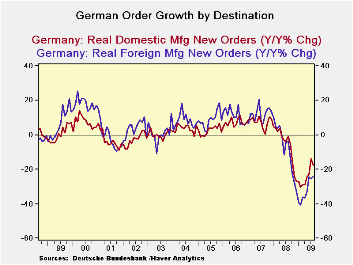 Global| Oct 07 2009
Global| Oct 07 2009German Orders Growth Extended
Summary
Order Trends: German new orders growth was extended as foreign orders snapped back after a one-month decline. Domestic orders fell by 1.9% after surging by 9.5% in July. Orders have been rising steadily, strongly, over the past six [...]

Order Trends: German new orders growth was
extended as foreign orders snapped back after a one-month decline.
Domestic orders fell by 1.9% after surging by 9.5% in July. Orders have
been rising steadily, strongly, over the past six months with domestic
orders up in five of those six months and foreign orders up in four of
those six months. Both series are showing continuing acceleration not
just growth. In the current quarter domestic orders are outpacing on
the back of a one month 9.5% spurt in orders in July as the new quarter
began.
Foreign order sources: Orders from
countries outside the euro zone alone jumped 5.9%, in August while
foreign demand for German manufactured goods from the other 15
countries sharing the euro rose by just 2.8% in August from the month
earlier. Growth outside of the e-Zone drove German orders this past
month.
Euro-Area policy cuts no slack - Apart
from orders, the European Commission Wednesday warned nine countries,
including Germany, that their budget deficits are too large. This is
the legacy effect of having used domestic deficit spending to bolster
the economy in the recession. That policy response was good thing, but
it now puts those countries afoul of EU Commission rules.
Out of touch with reality? The warning
comes at an odd time since Euro-central bankers and policy officials in
the US have underscored that the time is not right to withdraw
stimulus. Hanging the ‘Sword of Damocles’ over the heads of the various
ECB nations does not seem like the right policy tilt to encourage them
to keep their stimulus efforts in place. It sounds a lot like pressure
to get you house in order NOW! The EU Commission is using bad judgment
and being too strict on rules of evaluations at a time like this. Yes
it is just this sort of thinking that keeps the euro strong but it also
unduly complicates and hampers policy. This stance reminds me of the
ECB’s problems in cutting rates in timely fashion in the recession. The
target rate ceiling on the HICP hampered the ECB in the pits of the
crisis. It cut rates as a part of an ‘international effort’, using that
as an excuse to cut rates with headline inflation well over its ceiling
at the time. I suppose we are to understand that this warning from the
EU Commission as a formality that has come as scheduled. But in times
such as these what is the merit? Does this act brand the EU Commission
tough or as out of touch?
| German Orders and Sales By Sector and Origin | ||||||||
|---|---|---|---|---|---|---|---|---|
| Real and SA | % M/M | % Saar | ||||||
| Aug-09 | Jul-09 | Jun-09 | 3-Mo | 6-Mo | 12-Mo | Year Ago | QTR-2-Date | |
| Total Orders | 1.4% | 3.1% | 3.8% | 38.7% | 17.8% | -21.1% | -2.4% | 43.7% |
| Foreign | 4.6% | -2.4% | 6.9% | 42.1% | 19.2% | -24.0% | -3.8% | 30.7% |
| Domestic | -1.9% | 9.5% | 0.5% | 35.5% | 16.4% | -17.6% | -0.9% | 59.5% |
| Real Sector Sales | ||||||||
| MFG/Mining | 2.7% | -0.5% | 1.1% | 13.8% | 6.7% | -16.6% | 1.8% | 14.4% |
| Consumer | 0.4% | -0.7% | 0.1% | -0.8% | -0.4% | -8.4% | -3.0% | -4.8% |
| Consumer Durables | 1.6% | 0.5% | -2.6% | -2.3% | -1.1% | -20.6% | -1.8% | 3.8% |
| Consumer Nondurable | 0.2% | -0.9% | 0.5% | -0.8% | -0.4% | -6.2% | -3.2% | -6.3% |
| Capital Goods | 4.2% | -2.0% | 1.4% | 15.4% | 7.4% | -20.9% | 4.8% | 18.7% |
| Intermediate Goods | 2.5% | 1.3% | 1.6% | 23.9% | 11.3% | -16.2% | 1.0% | 22.9% |
| All Manufacturing Sales | 2.6% | -0.5% | 1.2% | 13.8% | 6.7% | -16.9% | 1.9% | 14.3% |
Robert Brusca
AuthorMore in Author Profile »Robert A. Brusca is Chief Economist of Fact and Opinion Economics, a consulting firm he founded in Manhattan. He has been an economist on Wall Street for over 25 years. He has visited central banking and large institutional clients in over 30 countries in his career as an economist. Mr. Brusca was a Divisional Research Chief at the Federal Reserve Bank of NY (Chief of the International Financial markets Division), a Fed Watcher at Irving Trust and Chief Economist at Nikko Securities International. He is widely quoted and appears in various media. Mr. Brusca holds an MA and Ph.D. in economics from Michigan State University and a BA in Economics from the University of Michigan. His research pursues his strong interests in non aligned policy economics as well as international economics. FAO Economics’ research targets investors to assist them in making better investment decisions in stocks, bonds and in a variety of international assets. The company does not manage money and has no conflicts in giving economic advice.
More Economy in Brief
 Global| Feb 05 2026
Global| Feb 05 2026Charts of the Week: Balanced Policy, Resilient Data and AI Narratives
by:Andrew Cates






